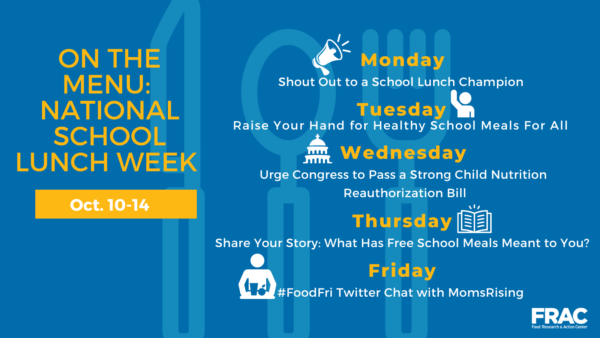Media Contact:
Brittani Riddle
briddle@frac.org
202-640-1089 ext. 3039
Statement attributable to Luis Guardia, President, Food Research & Action Center (FRAC)
WASHINGTON, October 11, 2022 — Millions of children rely on school meals each day to help them learn, grow, and thrive. During National School Lunch Week, we reflect on the essential role that the National School Lunch Program plays in the lives of families across America and celebrate the dedicated school nutrition professionals who work tirelessly to ensure that children receive the healthy school meals they need.
The past few years have shown the promise of our school lunch program reaching its full potential—and the perils of taking that critical support away. One of the first sets of actions Congress and the U.S. Department of Agriculture took at the outset of the Covid-19 pandemic was to make school meals available to all children at no charge and provide schools with additional dollars and flexibilities to ensure meals could continue to be served.
The impact was profound: ten million additional children received access to school meals at no charge, school nutrition departments received the funding they desperately needed to maintain solvency during both school closures and the return to in-person learning, and what could have otherwise been a catastrophic increase in childhood food insecurity was averted. Yet, Congress has allowed that policy to expire. Millions of families that relied on school meals being available at no charge have lost that lifeline, even amid the highest spike in food prices in more than 40 years and despite the evidence showing that healthy school meals for all children reduces food insecurity, improves health, and helps children succeed in the classroom.
FRAC shares the Biden Administration’s goal of ending childhood hunger in America by 2030 and is pleased to see that Healthy School Meals for All is an integral component of the Administration’s landmark National Strategy on Hunger, Nutrition and Health. But our response to the pandemic showed that bringing school meals to millions of additional children need not take several years. Making healthy school meals for all children at no charge a permanent part of our nation’s social safety net should be a top priority when Congress returns next month. With millions of households with children reporting food insecurity—and the burdens being disproportionately shouldered by people of color and those with low incomes—we must act now.
In its resolution creating National School Lunch Week sixty years ago, Congress called on all Americans to observe the week with “appropriate ceremonies and activities.” We can think of no activity more appropriate than Congress permanently ensuring that every child has access to school meals regardless of ability to pay. We have the resources to accomplish this goal and the evidence showing its effectiveness. All that is lacking is the political will.
Hungry children cannot learn. Hungry children cannot wait. Hungry children are counting on us, and we cannot let them down. This National School Lunch Week, join us in raising your hand for healthy school meals for all.
###
The Food Research & Action Center improves the nutrition, health, and well-being of people struggling against poverty-related hunger in the United States through advocacy, partnerships, and by advancing bold and equitable policy solutions. To learn more, visit FRAC.org and follow us on Twitter and on Facebook.

Get Vocal on Social:
Need ideas on how to raise awareness about National School Lunch Week, October 10-14? Check out @fractweets menu of activities for ideas on how you can celebrate #NSLW22. https://bit.ly/NSLW2022

